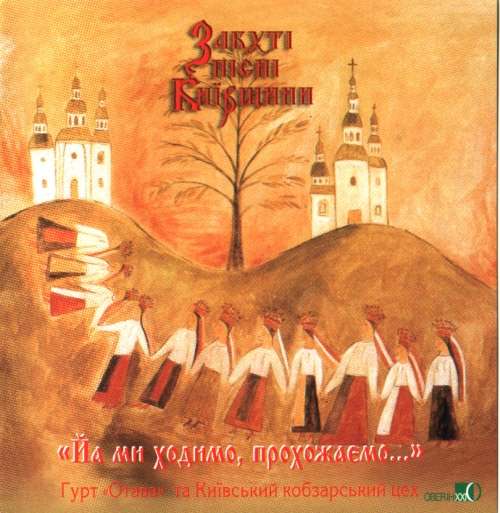
The songs on the album are performed by the folklore group "Otava" ("the first grass after cutting") headed by Hanna Koropnichenko. The group has already existed for many years researching und studying the singing tradition of Kyiv and adjacent regions.
Kobza lyrics have been presented by members of artistic group "Kyiv Kobza Guilds".
Tracklist:
1 Skinija izlataja Kovcheh Zavjeta
2 Ja my hodymo, prohodzhajemo
3 Prysvjatyj Vasylij pishov schedruvaty
4 To St. Barbara
5 Vechirnjaja ziron'ka zazhyhajet'sja
6 Ptychka nevelychka po polju litala
7 To Khrist on the Khross
8 Pochala na vesnu da j voskresaty
9 Solovej, solovejko
10 Ne kuj, zozule, j u dibrovi
11 To St. Georg
12 Oj, u luzi na dubochku
13 Nema v sviti pravdy
14 Scho ja v bat'ka ta j na jodhodi
15 Posluhajte podruzhechky
16 Oj, hto p’je – tomu nalyvajte
17 Oj, z – za hory, da j z – za kruchi
18 Da zabjeleni snjezhky, zabjeljeli bjely
19 About Shvachka and Bondarenko
20 Boh Sozdatjet' vs'omu Svjetu
21 Isuse mij, preljubeznyj
(320 kbps, cover art included)
3 Kommentare:
thank you again. -regards, a.v.
Survivors of the "Holodomor" farse!
The result of Stalin’s policies was the Great Famine (Holodomor) of 1932–33—a man-made demographic catastrophe unprecedented in peacetime. Of the estimated five million people who died in the Soviet Union, almost four million were Ukrainians. The famine was a direct assault on the Ukrainian peasantry, which had stubbornly continued to resist collectivization; indirectly, it was an attack on the Ukrainian village, which traditionally had been a key element of Ukrainian national culture. Its deliberate nature is underscored by the fact that no physical basis for famine existed in Ukraine. The Ukrainian grain harvest of 1932 had resulted in below-average yields (in part because of the chaos wreaked by the collectivization campaign), but it was more than sufficient to sustain the population. Nevertheless, Soviet authorities set requisition quotas for Ukraine at an impossibly high level. Brigades of special agents were dispatched to Ukraine to assist in procurement, and homes were routinely searched and foodstuffs confiscated. At the same time, a law was passed in August 1932 making the theft of socialist property a capital crime, leading to scenes in which peasants faced the firing squad for stealing as little as a sack of wheat from state storehouses. The rural population was left with insufficient food to feed itself. The ensuing starvation grew to a massive scale by the spring of 1933, but Moscow refused to provide relief. In fact, the Soviet Union exported more than a million tons of grain to the West during this period. - https://www.britannica.com
Kommentar veröffentlichen